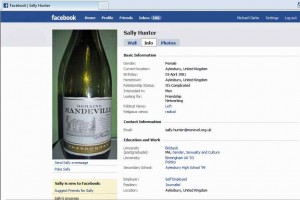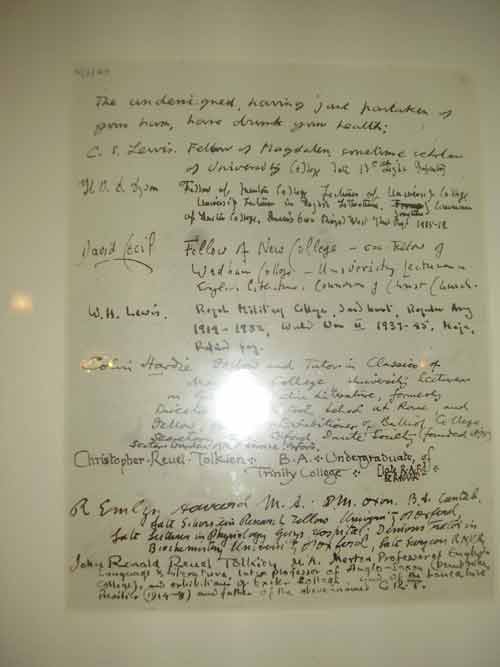It’s going to be quite an intense day on Saturday for a few of us: Rick, Nick and myself have both a reading and a tutorial. The reading is c. 2,250 words and the tutorial extract can be up to 3,000. I slightly exceeded the word limits on both so I’ve got about 5,600 words in for feedback in one way or another — in two different novels, which might land me in trouble.
I really wanted to make a start on ‘The Angel’ and I began by trying to do something clever and writing a scene which, like Alan Ayckbourn’s ‘Norman Conquests’, brought together characters from different works and had them interact in scenes which were interchangeable. I will probably still use the scene. It’s when Sally(from ‘Burying Bad News’) wants to bone up on wine. It turns out she knows Kim (from ‘The Angel’) from London and Kim persuades James to put on a wine tasting at ‘The Angel’. Sally brings Jez along and meets Emma and Gordon, Emma’s doctor father who tries to take over the wine tasting duties. Both Sally and Emma get smashed and Sally sees glamorous Emma as someone who can help make her image over and persuades her to accompany her to Bicester Village Designer Outlet to buy some discount brand label clothes cranking up the balance on the credit card she’s just wangled. In the course of this Sally would give Kim the third degree about why she’s left London and come to the sticks to work for an ex-banker. Kim would show Sally the space in the pub that she’s planning to turn into her studio. Quite a nice little scene I thought but it was quite dialogue heavy and didn’t really get into the meat of the story so I thought it might be a bit of a missed opportunity to present that for the tutorial.
Interesting that I referred to Alan Ayckbourn as I’ve long admired his plays — the way he works within a limited scope and is marvellously funny but still exposes the deepest recesses of his characters’ psyches. What I’ve described above is not too dissimilar to one of his plots.
So I decided to put the wine tasting writing on hold and write something different — and I had about two or three days to do it and last night’s class to fit in as well (in addition to work). I had a very firm image in my mind about how I wanted the novel to end and, bearing in mind feedback about how a reunion on the Millennium Bridge was a bit of cliche, I decided to construct an ending to the novel that took the cliche and subverted it.
I worked pretty obsessively on the piece as there’s not much opportunity for ‘face-time’ with the tutors and I wanted to deliberately address a lot of my concerns about the novel in the submitted extract. I got up at 5.30am this morning so I could send it in before midday (I failed by 8 minutes).
I also put my fieldwork research in the Tate Modern to good use by setting almost all the action in the gallery. I don’t know how successful a strategy it will turn out but I had the characters look at painting that were then used to reflect concepts and emotions from the plot. I tried to use paintings that readers would have a good chance of knowing, such as Warhol’s ‘Marilyn Diptych’ and Lichtenstein’s ‘Whaam!’. My reference to the latter wasn’t very subtle but it’s not a subtle painting. I really want to use the Cy Twombly paintings I saw last week but can’t find them on the internet. I’m planning another trip to the Tate next week to check. I also ensured that my semi-mystical experience inside Balka’s huge box was put to good use (see blog posting below). I hope Alison says that this works because, if it does, it could be quite a hook for the novel as I would see it being marketed at the kind of people, like me, who are reasonably educated and open to new ideas but who know very little about certain types of culture (in this case modern art). It works very well with things like Morse and his fixations with Wagner and Mozart.
I’m not sure how the piece hangs together. Because of the word limit (yes I came up against the word limit and had to edit it down even though it was put together quickly) it’s probably more rushed than I’d anticipate in a full length novel. For example, I’m concerned that I’ve telescoped the plot a bit too rapidly into the dialogue so there might be some cliches in there. However, some of the most basic emotions must transcend cliche. If a character says ‘I love you’ or ‘I want you’ is that a cliche? I don’t think so but I still feel like there must be cleverer ways of writing that or something like ‘Be there for me.’
I wanted to write something that had both dialogue and some extended description but I think I would want to hone the diction and rework some of the imagery in a re-draft. However, I wanted to use the extract to bring in and work on some of the themes I would see running through the novel, such as obsession, depression, communication, misunderstanding, ambition, modern art, etc. There’s also themes pubs and urban-rural tension but these aren’t so evident in the extract.
Now I’ve sent it in I’ll probably do something completely different tonight like watching television — I thought the new Rab C. Nesbitt wasn’t bad last week (I watch it with subtitles as I like to read how the dialogue is written) and ‘Bellamy’s People’ was ok last week.
And I’ve got six absorbing chapters from the other class members to read in detail before Saturday.
I’ve read through two or three quickly already but I’ll read them all through, let them stew away in my subconscious for a while, and then annotate them with any detailed comments I might have.



